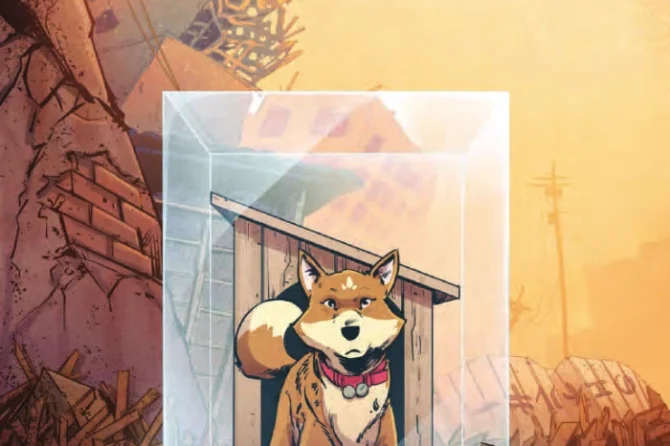Matt Hughes has been contemplating an historical novel for over sixty years.
He’s begun writing that work and started a GoFundMe campaign to help him get some support while doing so.
To help whet supporter’s appetites, he sent along an excerpt of the first chapter.
Please consider supporting his efforts (Matt is a great guy and a “friend of Amazing Stories”; besides – support our creatives!) as you read this introductory chapter 0f –
To the Ends of the Earth
I’ve started a GoFGundMe campaign to support the writing of a historical novel I’ve been thinking about for almost sixty years: about a one-ship scouting expedition Alexander the Great sent to circumnavigate Africa. Soon after the ship sailed, Alexander died. No one knows what became of the ship and crew.

CHAPTER ONE
The Persian slave came running then stopped and bowed just inside Leonides’s peripheral vision, waiting for the shipwright to acknowledge him.
“What? I’m busy here.”
The slave might once have been among Darius’s Immortals. Defeat on the battlefield and years of servitude had driven the arrogance from him. He ducked his head and took a half step backward. “O best one, you are summoned.”
“By whom?”
“A soldier.”
“Tell him I’ll be there in a while.”
The Persian did not go. Leonides surmised the slave had been sent not just to deliver a message but to bring him.
“Go,” he said.
The man scurried away and Leonides returned to his supervision of the gang of men who were reassembling the big vessel. Atromitos, a penteres with three banks of oars like a trireme but with five men to an oar, had been built in the shipyards in Sidon, the Phoenician shipwrights having adapted to the Hellenistic practices in how to put a vessel together. Once made fit to sail, it had been rowed north to the mouth of the River Orontes and as far upstream as its shallow draft would allow. Then it had been hauled out of the water and onto a landing, where it had been carefully disassembled so it could be carried in pieces inland, a seven days’ march, to the growing town of Thapsakos on the Euphrates. And now the ship was being put together again.
Leonides son of Peisander, citizen of the free polis of Rhodes, had very few skilled shipwrights under his watch, though all of the men who swarmed over the rapidly rising hull of the warship were trained seamen. Still, every day he said, more often than he cared to, “Fit the joints perfectly before you hammer in the treenails. If she springs a leak, you’ll be the ones bailing or sinking.”
All in all, he was satisfied with the work. A few more days, and the fiver would be borne on the southbound current to where the new harbor was being dug in the riverbank at Babylon and the Great King Alexander was assembling a fleet that would carry the army down the Persian Sea to conquer the spice-rich lands of the tent-dwelling Arabs.
Leonides expected to be part of that expedition. It ought to be the easiest campaign he had participated in since answering the Makedonian king’s call for experienced seafarers to come help him take the ancient city of Tyre, with all the riches its Phoenician traders had accumulated over their centuries of owning the Inner Sea from the Nile to the Pillars of Heracles.
Myrrh and frankincense, that’s what the Arabs farmed somehow — nobody knew how — and they brought in fragrant, soothing nard all the way from India. And that’s what Leonides would find and sequester. Perhaps, too, some of the silk the tribesmen were said to import from the mythical lands beyond India, where solid earth ended and the world-girdling Ocean began.
With any luck, and no stinting of effort, he could amass enough of the fabulous stuffs to resign his post and go home to Rhodes, there to buy himself a trading vessel, an akatos, or even two of them. He already had half a talent of silver on deposit with a moneylender in Sidon; not a bad turn of events for the son of a man who had earned a mere drachma a day rowing other men’s boats. At least, that had been Leonides’s vague goal when he signed on to serve the King of Makedon — now become the Great King of most of the known world — but, strangely, the more he had crossed foreign horizons, the stronger their lure had grown.
Still, for the time being, he was working his trade and his earnings were piling up. Kneeling, he inspected a mortice and tenon joint, finding it a little loose, even with the wooden treenail driven through the three layers of wood. But the Atromitos had dried out over the double ten-days since she had been taken apart. Once back in the water, her timbers would swell and tighten. Not until she reached the boat sheds at Babylon would her hull be coated in pitch and covered with the thin sheets of lead that would protect her from sea worms.
A shadow fell over him. He turned and looked up to see a silhouette of a man in helmet and cloak. He rose to his feet and moved so that the sun was not in his eyes.
“Leonides of Rhodes?” The accent was Makedonian.
“I am,” he said, then added, “O best one.” Makedonians, especially their officers, as this one’s red cloak identified him, were notoriously touchy. And this one was showing no signs of amiability.
The man handed Leonides a thin leather package, its flap sealed with wax. There was some kind of seal impressed into the wax, but he did not recognize it.
“Can you read?” said the officer.
“Of course.” Leonides cracked the dried wax and opened the flap. Inside he found a square of parchment. He drew it out, unfolded it, and read what was written there in black ink.
“Are you sure you can read?” said the Makedonian.
“Some of us can do it without speaking the words.” He read the missive again, trying to make sense of it. He looked to the officer. “I am to report forthwith to the Navarch Nearchus. What’s that about?”
“They don’t tell me, Rhodian. I’m to bring you.” He paused then added, in a mimickry of Leonides’s accent, “Forthwith.”
He reached to take the shipwright by the arm. Leonides stepped back. “Wait up. I’ve got to get my possessions.”
“Make it fast.”
#
The town of Thapsakos was being built by slaves, most of them the defeated infantry and erstwhile camp followers of Darius the Great, but the soldiers — a mixed lot of Ionian Hellene mercenaries with a few survivors of the Scythian cavalry — were in tents along the eastern shore of the river. The camp prefect, Archelaus, of course a Makedonian, had established his headquarters in one of the few buildings that had been on site when Alexander’s army came up from the coast. It was to here that Leonides, accompanied by his impatient escort, went to retrieve his funds from safekeeping.
The clerk, not surprisingly, was a Babylonian. They were known to be best at mathematical calculations and Archelaus had plucked him from the intake of captives before he could be auctioned off to one of the slave dealers who crowded around the army after every battle. Leonides had not bothered to learn the man’s name, but they recognized each other on sight.
“I’m called to report to the navarch,” he said, flourishing the parchment. “I need to withdraw my funds.”
The clerk looked up from the table where he had been sliding polished wooden beads up and down along grooves in a lead frame. He showed the expression of a slave who is asked to step over the bounds of his assigned responsibilities. “I’ll need a say-so from the commandant.”
“Where is he?”
“We got a new draft of soldiers this morning. He’s inspecting them.”
Leonides’s escort stepped forward, shouldering the shipwright aside. “Send for him now. I’m in a hurry.”
Relief flooded the Babylonian’s face. He shouted some barbaric name and a man came running in from an inner room, ducking his head in automatic response to the sight of a man with a helmet and sword. A moment later, he was scuttling out the door.
Now there was nothing to do but wait and Leonides was aware of the building anger beside him. To the clerk he said, “Perhaps you could determine how much I’m owed while we’re waiting for the commandant to arrive.”
“Good idea,” said the man at the table. He rose and went to a set of shelves behind his station, found a leather-covered folder and brought it back. He began to flip through sheets of parchment.
“Here we are. You were last paid in Sidon. Since then . . .” He cleared the arrangement of beads on the abacus and began to slide the pieces of polished wood, pausing to check whatever was written on the sheets. In moments, his calculations were complete.
“Twenty-eight days. One hundred and sixty plus eight drachmai,” he said. “As soon as Commander Archelaus author — ”
“Does that include today’s wage?” Leonides said.
“It’s just gone noon,” the clerk said.
“And I’ve been working since sun-up.” It was best to start early in the morning, even in spring, then rest in the shade during the heat of the midday. Not that the slaves got that latitude, but most of Leonides’s crews were freemen artisans, paid two to three drachmai a day. Leonides, as an expert shipwright and foreman, got six.
“All right,” said the clerk. He added three more silver coins to the total.
A little more time passed then the slave sent to alert Archelaus came scuttling back in. “He’s coming,” he said, adding a quick motion of his head that said the arrival would not be pleasant. He disappeared into the bowels of the building.
Not long after, Archelaus stepped into the room, wearing corselet and helmet, one hand on the hilt of his sword and a look on his face that said someone was about to have a very bad day. But when he took in the scene, his brows rose at the sight of the escort.
“Well?”
Leonides was about to answer, but the Makedonian beat him to it. “Hegelochus, attached to the staff of Nearchus. I’m here to collect this man. We’re waiting for your approval of his wages then I am ordered to take him south forthwith.”
“Orders?” Archelaus said, holding out the hand that no longer gripped the sword hilt.
Hegelochus produced a folded square of parchment. The commandant unfolded it and read it quickly, then once more slowly, his lips moving as he spelled out the words.
Then he handed it back. “This requires me to give you priority over any other consideration,” he said, and there was a question behind the statement.
Hegelochus was putting away his orders. “The order comes from the navarch,” he said, “but . . .” His hand made a fluttering gesture, like a bird lifting from the ground.
Archelaus understood. He turned to the clerk. “Give him his funds. Now.”
The Babylonian ducked his head then went into the inner room the courier had come out of, returning with a small chest, strongly bound in iron, closed with a brass lock. He produced a ring of keys from within his garment, selected one, and swiftly opened the chest.
Inside were leather sacks. He brought one out, placed it on the table, untied the strings that closed it and began to count out silver and arrange the coins in piles of even height.
“Quickly,” said the commandant.
The Babylonian fumbled, knocking over one of the piles. With shaking hands he reassembled it and continued the count.
“There,” he said, “One hundred and seventy-one drachmai.” He looked up at Leonides. “I’ll need you to sign — ”
“No, you won’t,” said the commandant. “Give him a purse to put them in.”
“Wait,” said Leonides. “I have another fifty drachmai on deposit.”
The Babylonian fetched another ledger, ran a finger down a column of names, and said, “So you do.” He counted out the coins. “That makes two hundred and twenty-one.”
He looked up. “That’s quite a lot to carry. I have some of the new decadrachmai. Shall I substitute some of them?”
Leonides had never seen one of the new mintage. “Yes,” he said.
The Babylonian went and retrieved a different coffer, opened it to reveal its shining contents. He counted out twenty of the brilliant coins, still gleaming from the mint down in Babylon, then added twenty coins in two- and four-drachma denominations and six oboloi to complete the count.
Hegelochus was clearly restraining his anger at the delay, but they had to wait while the clerk went in search of a large purse.
The commandant said, “Is that your chariot by the bridge?”
“It is,” said Hegelochus without looking his way.
Archelaus cocked his head. “Fancy.”
“It used to belong to one of Darius’s generals.”
“Didn’t do him much good, did it?”
“Not once the king and his cavalry caught up to them. Were you there?”
Archelaus threw back his shoulders. “At the Issus and the Gaugemela. I commanded a syntagmata. Eating dust and thrusting with the sarissa. Chariots didn’t do the Medes much good. We just opened ranks, let them in, then killed the horses. Chariot’s not much good without horses.”
“Good horses, though,” Hegelochus said. “Nisaean breed. They’re big, strong, and fast. Feed them on oats, they’ll run all day.”
“Those are Nisaean’s you’ve got out there, aren’t they?” the commandant said.
But Hegelochus did not respond, because now the clerk came bustling in with a leather purse and the Babylonian began to fill it with Leonides’s coins. The barbarian was practiced at handling silver, and in no time he was handing the shipwright his savings. Leonides tied up the strings and tucked the purse into the bosom of his chiton, where it rested against the belt around his middle.
“Let’s go,” he said.
Archelaus wanted to prolong the conversation with Hegelochus, but the escort was already out the door, Leonides following.
Out in the street, the escort pointed toward the bridge and said, “Over here.”
“My clothes are in my tent. Plus there’s a book I don’t want to lose.”
“A book?” said the Makedonian. “Is it about ship-building?”
“No.” It was a segment of The Odyssey, in which the wily Ithacan who had conceived of the Trojan Horse sailed the wine-dark sea, encountering a cyclops and a witch who could turn sailors into pigs. Leonides was fairly well traveled himself now, but he had met nothing like those wonders. The world must have changed since the age of heroes, although sometimes he wondered if Homer just made things up.
“Then leave it. You can get new clothes in Babylon.” When he saw resistance in the shipwright’s face, he added, “My orders are to bring you at best speed to the navarch. Whether or not you arrive with a bruised face is not specified.”
For Makedonians, Leonides knew, violence was rarely a last resort. All too often, it was the first solution they applied to any problem. In the shipwright’s view, they were only nominally Hellenes, just a short step up from the barbarian Thracians against whose raids and rebellions the Makedonians had refined their warlike ways.
He would miss the book, but he had memorized several favorite passages. Now he dipped his head in the Hellene gesture of agreement and followed the soldier out of the town and toward the pontoon bridge that crossed the Euphrates. At the near end, he saw the chariot, fancy as Archelaus had said, in painted white wood with gilded trim and wheels. If it used to have sickle blades attached to the hubs, those thigh-cutters were now gone.
A pair of tall horses stood in harness, their reins held by a slave. Leonides had not seen Nisaeans before, though he had heard of them: the powerful steeds of Darius’s so-called “Immortals,” the Persian noblemen who had turned out to be no match for Alexander’s Companions on their scrappy little mounts.
“They are big,” he said to Hegelochus.
“Get aboard,” was the escort’s only reply. “I’m going to walk them over the bridge, then we’ll head south.”
Everyone knew the story of the bridge over the Euphrates. Alexander had sent his favorite general, Hephaestion, ahead of the army, with engineers and carpenters. And shipwrights, among whose number was Leonides the Rhodian. He had overseen the building of a number of the boats that went into the river in a double line, anchored with chains against the current. Planks were laid on top and lashed down, and then there was a way for men, horses, and wagons to cross the river dry-shod. Darius’s general, Mazaeus, had come up from Babylon with a small army of Hellene mercenaries and light cavalry to oppose the crossing, so Hephaestion stopped building, short of the far bank, and waited for Alexander to come up with the bulk of the army.
When Mazaeus saw the massed ranks of pikemen and cavalry, he fled south, burning crops as he went. The rest of the bridge was completed in a couple of days and the army marched across. But instead of chasing the Persians to the south, in scorched-earth country that would be short on forage, Alexander swung the army north at a forced-march pace along the Royal Road. He would cross the Tigris at a shallow ford before Darius could come north to block him.
The result: Alexander met Darius on more favorable ground — though it was ground of the Persian’s own choosing — near a village called Gaugamela. The Persians were routed and slaughtered. Darius fled but was soon killed by two of his own courtiers, who flung javelins into their king and left him to die in the sumptuous royal wagon.
Leonides knew that story, too — everyone did — as he now stood in the chariot while Hegelochus led the big horses across one of the pontoon bridges, but his mind was not on the events of years past. Up until this moment, he had been hustled along by the Makedonian officer, then tightly focused on getting his pay, and then hustled again out of Thapsakos. It was the usual way of things in the army: hurry up then wait. The waiting was when you tried to make sense of why you had to hurry.
Leonides had never been within a stone’s throw of the navarch Nearchus, Alexander’s favorite admiral. Nearchus’s overwhelming concern this spring ought to have been preparing for the combined-arms operation down the coast of Arabia, planning the logistics of which must be a formidable and complex task. Why was he singling out a Rhodian shipwright and summoning him “forthwith?”
He could find no answer. There were more than a dozen like him at Thapsakos, equally as skilled if not better. Yet somehow, whatever Nearchus had in mind, it seemed that Leonides son of Peisander, a free citizen of polis who had had a hankering to see more of the world than his city’s harbor, was the name that came to mind.
Well, he thought, we’ll find out.











Recent Comments